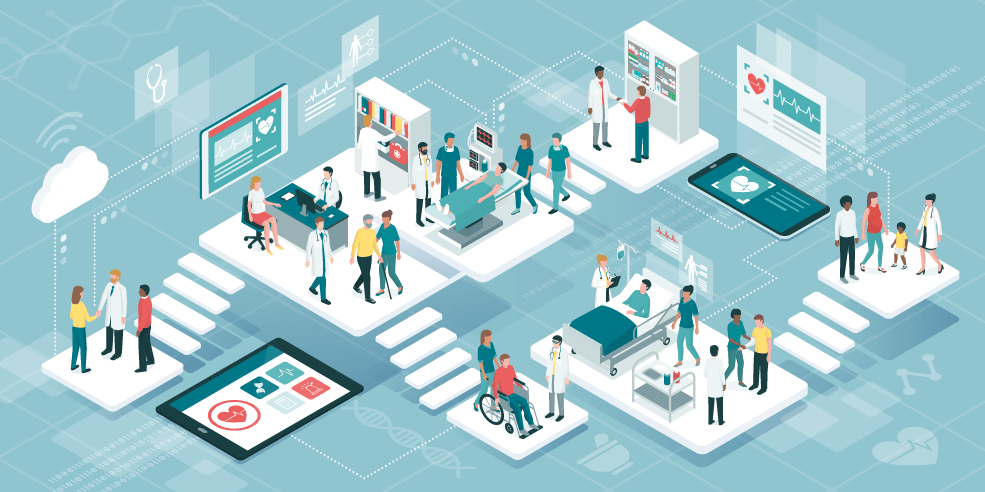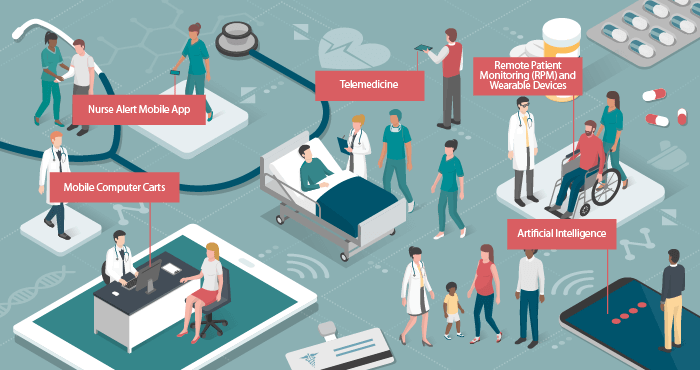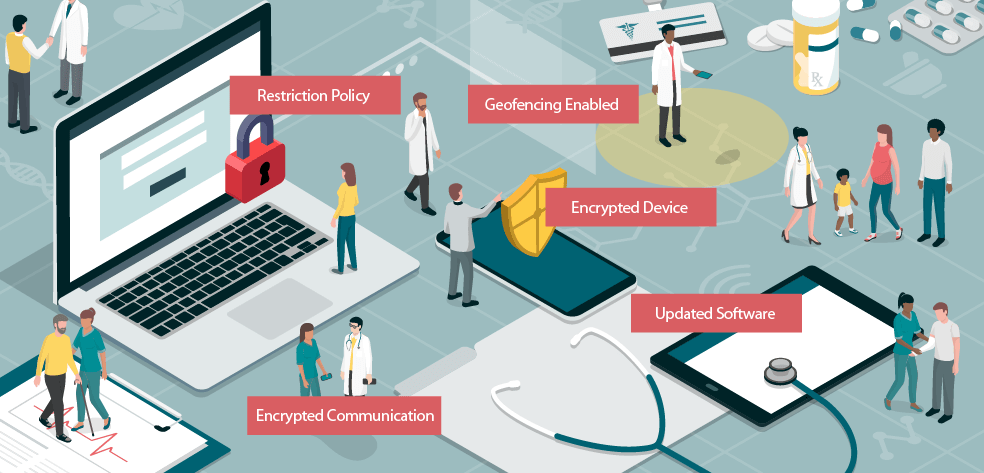Future of Mobility Solutions in Healthcare industry
Jan 02, 2019 | 42Gears Team
The rising trend of mobility solutions adoption can be seen most prominently in the healthcare industry. Embracing these solutions have resulted in improved patient care and better experience. Though some of these technologies such as IoT and AI are still nascent, however, bringing them into healthcare can be a game changer.
The future of healthcare relies on how well it can adopt these new mobile technologies. In recent years, many mobile healthcare technologies have been developed such as wearables, and Internet of medical things (IoMT) that greatly affect our healthcare system. A study by Zebra technologies, (2018) revealed that the use of mobile devices such as handheld mobile computers, tablets, cordless barcode scanners and mobile printers is upsurging in healthcare around the world. The survey also revealed that 72% decision makers felt that mobile devices are improving the quality of patient care, giving clinicians actionable intelligence at the bedside and reducing errors. The same report also revealed that an expected 97% of bedside nurses and 98% of physicians will use mobile devices in the hospitals by 2022.
Here is how mobile technologies make patient care better in hospitals:
1. Remote Patient Monitoring (RPM) and Wearable Devices
Wearables and remote patient monitoring devices are ready to change our healthcare system. According to Markets and Markets, the global market for medical wearable devices is expected to reach $12.2 billion by 2021. Wearables provide real-time access to health records and help in quicker diagnosis and treatment.
RPM and wearable devices help in the following ways:
- RPM devices can be used as a patch on diabetes patients to monitor blood pressure, sugar level and weight. The caregivers can track the medical conditions of patients and recommend appropriate treatment or medication as soon as possible. An alert can automatically be sent to care providers when a patient’s readings exceed safe limits.
- Patients with cardiac conditions can be fitted with a monitoring device containing sensors connected to smartphones which can be remotely monitored by caregivers. ECG data collected from sensor devices can be sent automatically to healthcare providers via a smartphone app.
- Patients with dementia can be equipped with wearable GPS trackers, which helps care providers to track the patient remotely all the time. They can get notifications whenever a patient crosses prescribed boundaries and allows providers to take quick actions.
2. Mobile Computer Carts
Mobile computer carts or workstations optimize the workflow to provide patients with quality care. It also facilitates connectivity within the hospital’s internal network. A doctor can access patients test results such as X-rays, CAT scans, open the files anytime with a mobile computer and discuss the results with the patients. These interactions can enhance the quality of care and treatment.
3. Telemedicine
Telemedicine is the use of electronic communications and software to provide healthcare services without visiting patients. This technology is mostly used for follow-up visits, specialist consultation, chronic diseases and where personal visit to doctor is not possible such as patient living in a remote area and require urgent treatment, in that case the doctor available there can share relevant information such as x-rays, scans, reports with specialist doctor and help patient in quick diagnosis and treatment.
4. Nurse Alert Mobile App
Managing multiple shifts, tasks, and patients are very difficult tasks for nurses in hospitals.
The nurse alert mobile app is the ultimate solution that allows nurses to optimize their time effectively, increase their productivity and deliver better nursing care to patients. The app involves nurses’ daily tasks, managing patient schedules, communicating with managers, and setting reminders. The app keep the nurses’ up-to-date with respective shifts, reminds them to attend the patients and give them medicine on time through pill reminders.
5. Artificial Intelligence
Scheduling a doctor’s appointment, keeping track of health records, tracking and following diet chart and exercise routine is difficult for patients and healthcare providers both. You may have tried chatting or discussing sports scores, or ask to turn on music with Siri or Alexa, but how about discussing medical reports with chat-bots? A company, Kore.ai offers a digital assistant that can connect patients to the healthcare providers, give appointment details, help them in payments. Some other chat assistant service offers information regarding use of particular drug in some specified conditions that helps doctors in recommending medicines and provide better treatment.
Mobility Solutions Can Pose Security Risks
Before implementing mobility solutions for patient care , healthcare providers must assess the security risks posed by these mobility solutions. Let’s have a look at the possible security threats:
- The possibility of wearables and RPM devices to be exploited or hacked by cybercriminals due to security slack.
- Ransomware is another challenge that healthcare providers can face. Sometimes, to recover patient data that is encrypted by malicious parties, they have to pay ransomes.
- Doctors rely on data transmitted by mobile devices for remote diagnosis and treatment. Malware on the device could alter the patient data, resulting in wrong diagnosis and treatment which can be fatal for their health.
- Lost, misplaced or stolen mobile devices of patients or caregivers might put patient records in danger and can cause inconvenience for future diagnosis and treatment.
In order to mitigate the risks and ensure mobile devices provides benefits to patients and care providers, a strong mobility strategy is required before implementing them into healthcare institutes. Healthcare providers must ensure that each mobile device and data is secured. And these devices must be integrated well with a Unified Endpoint Management (UEM) solution.
Before providing devices to patients and caregivers, mobile devices must fulfill the following prerequisites:
1. Devices must be encrypted, there must be some form of authentication in place for accessing the data on devices.
2. Communication must be encrypted: Any communication between the devices, smartphones, wearables, apps, and healthcare systems must also be encrypted.
3. Software must be updated: Any software on the device, including apps or operating system, must be regularly updated.
4. Restriction Policy must be enforced: Use of devices must be limited for a particular purpose only. For example, tablets given to patients or nurses must be locked for other purposes except the relevant.
5. Geofencing must be enabled on the device, so that when a patient crosses the prescribed boundary, it will notify the care provider and block the device or wipe the patient data immediately.
Mobility solutions bring innovation in healthcare and life science industries. It provides many benefits to them such as data security and reliability, provides real-time data on the spot, reduces cost like printing, sending emails etc. In future, these mobile technologies are expected to grow and will be increasingly implemented in healthcare. Healthcare organisations must assess all the security risks before implementing the mobile solutions in hospitals or for patient’s use. Also, it is very important that, they must be integrated with some UEM solution providers to provide a secure deployment of these devices and technologies.
42Gears UEM offers a seamless solution to the healthcare industry, can be well integrated with healthcare devices and systems easily, effortlessly and ensures devices and data security.
Explore for more details, at 42Gears UEM solution.
Subscribe for our free newsletter









